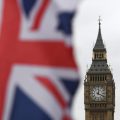With Great Britian’s vote now imminent, the prospects illustrate an astounding comeback by the Labour party in the polls since the surprise early elections on April 18th, and the peak of their deficit on April 26th. From the then onwards, Jeremy Corbyn has been charging forward in the approval ratings, and the situation on the eve of the election, according to the “Poll of Polls,” an aggregate of the various surveys, is a Conservative lead of only 8 points over the Labourites, down from 20 points on April 26th. If this result reflected true voter sentiment, Theresa May would come out of the elections with enough of a majority to keep her in power with more than enough seats to govern effectively. But the various polls fall into conflicting two groups, one with a relatively consistent gap of up to 12 points in favor of the Tories, while the other shows a far greater level of uncertainty, with the two parties heading into a photo-finish with a razor-thin gap of barely one point. Considering the precedents, namely the outcome of the Brexit referendum that resulted in the outright humiliation of the public opinion analysis sector in general, the polls that came closer to the actual outcome were those of ComRes, who predicted the correct result within a 2-point margin of error. The difference between ComRes and the others, such as Survation, can be explained by their divergent methodologies: Survation & Co. don’t count undecided voters or those who don’t intend to vote, while ComRes and other similar polls attempt to determine a specific voter intention for the undecided or non-voting group, swaying the results of the poll.
In any event, Corbyn’s recovery has been extraordinary, and May’s decline equally so, and both are easy to explain. For his first two years as Labour party leader he was vilified, derided, and attacked by his own party while the UK’s predominantly conservative media painted him as a communist relic of a bygone era. Theresa May must have thought her electoral campaign would have been a victory lap of the isle, waving the banner of Brexit. But Corbyn and the Labour party launched a manifesto that struck at the heart of the problems faced by the masses, who since 2008 have endured harsh austerity and savage cuts to social services while watching the financial elite reap unprecedented profits. Talk of the NHS, education, welfare, and the chronic lack of affordable housing immediately grabbed the attention of the electorate, even more so as May dug herself even deeper by threatening to raid pensioners’ hard-won assets if they should require frequent long-term care for ailments common in old age, such as Alzheimer’s and other debilitating conditions. The “Dementia Tax” would ostensibly avail itself of all assets above £100,000, including home and savings, to pay for the care. Despite a hasty retreat, the ill-advised proposal has sowed doubt among current and future pensioners. Perhaps most important of all, the campaign has allowed the public to get to know Corbyn directly, without the biased filters of the media, and the chemistry between the Labour leader and the electorate has been immediate. While May, conscious of her own oratory incompetence, has shown herself to be weak, indecisive, and far from the leader she had hoped to portray. So much so, in fact, that whispers in the Palace of Westminster are already spreading doubt that, even if May wins the election, there is no guarantee that she will be able to count on unconditional support from Conservatives. Whichever way this vote may go, a change in leadership is on the horizon.

Senza categoria
UK: However this election may go, a change in leadership is on the horizon. Bye bye, Theresa 😊
Alberto Forchielli8 Giugno 20170
Share



















Lascia un commento